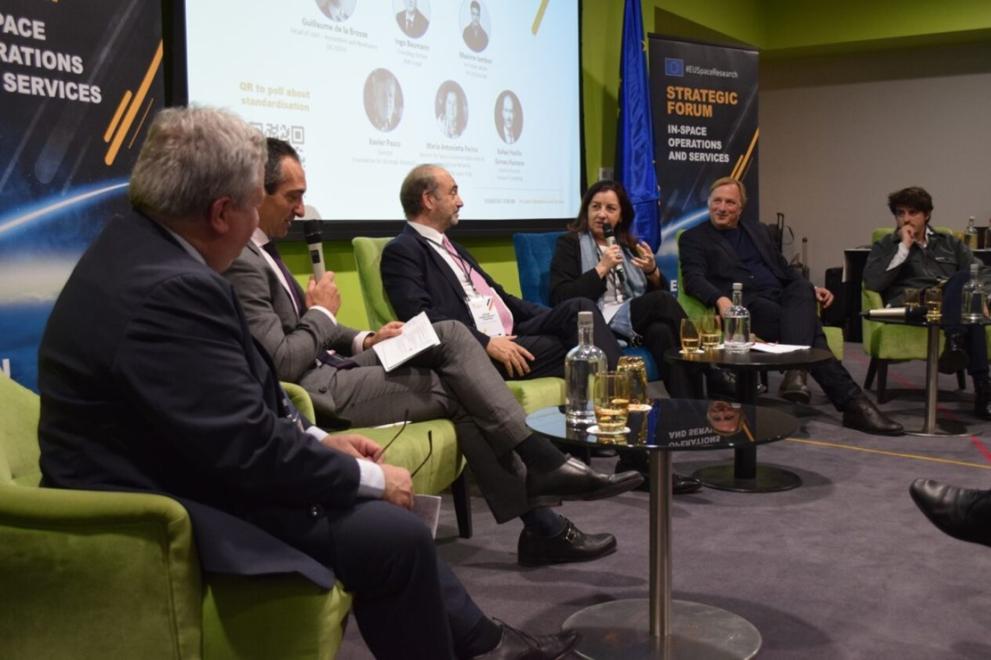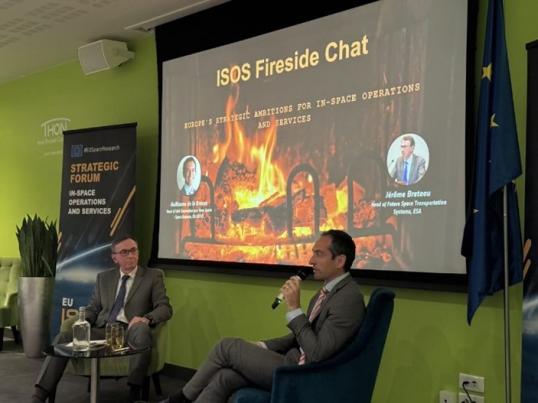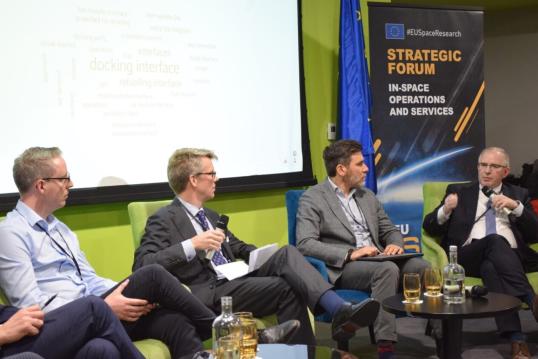
The second edition of the EU ISOS Strategic Forum took place in Brussels, bringing together around 150 stakeholders from across Europe. Participants included, policymakers, government representatives, industry and academia. Organised by DG DEFIS B2 (Innovation and New Space – Space Defence), this second forum highlighted the growing importance of In-Space Operations and Services (ISOS) as the backbone of a new strategic capacity for the EU: Act in Space. Through dynamic panel discussions and interactive Q&A sessions, the event provided insights into the evolving landscape of in-space servicing, assembly, manufacturing and logistics while addressing the challenges to the full development of the ISOS market in Europe. After the welcome address offered by Director for a Secure and Connected Space Catherine Kavvada, the first two panel discussions, moderated by Daniel Noelke and Christos Ampatzis (B2) and Guillaume Galtier and Marco Detratti (A2, A4), hinged on the potential of ISOS as an enabler for key applications and defence, respectively.
While the United States and China continue to lead in ISOS development, the European Union is rapidly cultivating a promising ecosystem. The EU is, using four key tools to foster the ISOS ecosystem: legislation, standardisation, technology development and the development of applications and services. Since Member States seldom have the capacity to perform ISOS on their own, the need for action at EU level is more pressing than ever. In this context, competitiveness is of paramount importance. A start-up pitching session moderated by Irene Sánchez Cebrián (B2) showcased the innovative solutions and technologies developed by New Space actors in the ISOS domain. It was followed by a “fireside chat”, during which Guillaume de La Brosse (Head of Unit for Innovation and New Space – Space Defence, B2) and ESA’s Head of Future Space Transportation Systems Jérôme Breteau delved into the intricacies of “Europe’s strategic ambition for In-Space Operations and Services”. DG DEFIS took the occasion to communicate its plan to begin with the preparation of a unique pilot mission as early as 2025, with the ambition to demonstrate technologies and services by 2030, and invited Member States and the private sector to join forces. This pilot mission would be the seed for a new future flagship focusing on the 24/7, high-responsive service provision to the EU’s and Member States’ infrastructure in space.
The success of this second edition of the ISOS Strategic Forum showed that cooperation at the policy and standardisation level are key issues in the domain. It also highlighted the importance of a shared strategic vision at European level to ensure alignment among all relevant stakeholders; as well as the key role of a clear regulatory framework in preventing fragmentation and supporting the development of the ISOS market in Europe, especially for start-ups and SMEs. Establishing common standards and ensuring interoperability between systems —such as docking mechanisms— was identified as a critical step towards sending clear demand signals that accelerate market growth.
During the second day, Guillaume de La Brosse moderated a first panel on “A regulatory environment to foster a strong European ISOS ecosystem”, after which Christos Ampatzis and Daniel Noelke delved into another panel exploring the establishment of standards for ISOS and related technologies, including by identifying priorities and potential challenges.
Unlocking New Potential for the EU Space Sector
ISOS offers a broad spectrum of opportunities for the European space industry and the EU Space Programme. These include satellite life extension, cargo transport, and satellite payload upgrades or exchanges. With over 20,000 satellites expected to launch in the next decade, space, particularly Low Earth Orbit (LEO), is becoming increasingly congested. Active Debris Removal (ADR) initiatives, a key component of ISOS, are essential to mitigate space debris and ensure sustainable space operations.
Defence experts at the forum highlighted that ISOS capabilities could significantly enhance the EU’s security and resilience in Space and on Earth by enabling in-situ inspection, upgrading, repairing, and reconfiguring satellites. However, leveraging ISOS for defence purposes requires a robust concept of operations (CONOPS) and strict adherence to confidentiality and security protocols.
A Unified Vision for Europe
The EU ISOS Strategic Forum highlighted the consensus that advancing ISOS technology and nurturing the globally growing ecosystem of in-space operations and services requires a clear strategic vision that takes into account the Union’s strategic autonomy. Participants underscored the importance of regular consultations with ISOS providers, end-users, and institutional stakeholders through focus groups and informed dialogues. In that regard, the prospect of an adequate EU Space Law makes even more relevant the potential of developing an autonomous ISOS sector, addressing the competitiveness, safety, resilience, and sustainability of space activities.
The EU ISOS Strategic Forum has set a clear agenda for the future, aiming to drive innovation, enhance collaboration, and establish Europe as a leader in the burgeoning field of In-Space Operations and Services.
Details
- Publication date
- 18 June 2024 (Last updated on: 18 June 2024)
- Department
- Directorate-General for Defence Industry and Space


